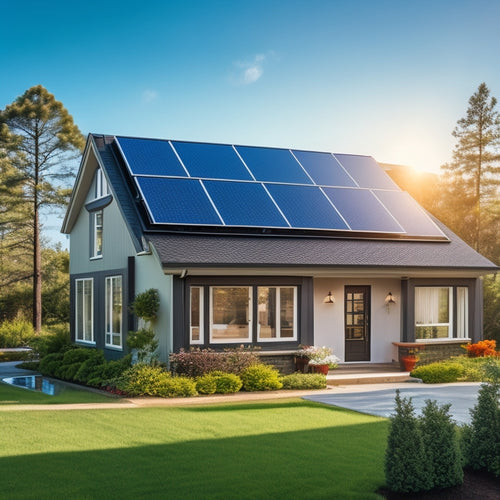
What Are the Most Efficient Commercial Solar Panels for Businesses
Share
You're looking for commercial solar panels that maximize energy output while minimizing costs, and prioritizing high efficiency rates and durability is essential to achieving this goal. Top brands like SunPower, Panasonic, and Trina Solar lead the way in innovative technology, with SunPower's X-Series achieving an impressive 22.8% efficiency rating. When evaluating options, consider metrics like efficiency ratings, temperature coefficient, fill factor, and power tolerance. With high-efficiency panels, you can expect increased energy output, reduced system size, and lower installation costs. As you assess your commercial solar panel options, you'll want to investigate further into the factors that'll help you make an informed decision.
Key Takeaways
- High-efficiency commercial solar panels from brands like SunPower, Panasonic, and Trina Solar offer superior performance and energy output.
- Panels with high power output per unit area, such as SunPower's X-Series, reduce overall system size and installation costs.
- Efficiency ratings above 20%, low temperature coefficients, and high fill factors are key metrics for evaluating commercial solar panel performance.
- High-efficiency panels provide significant cost savings, reduced land requirements, and enhanced environmental benefits for businesses.
- Evaluating installation considerations, local incentives, and manufacturer warranties is crucial when comparing commercial solar panel options.
Top Rated Commercial Solar Panels
Several top-rated commercial solar panels stand out from the rest, boasting high efficiency rates and impressive durability. You're likely considering investing in a solar panel system for your business, and understanding the top-rated options is essential.
When evaluating commercial solar panels, you should prioritize solar panel technology that maximizes energy output while minimizing costs. Look for panels with high power output per unit area, as this will reduce the overall system size and installation costs.
Additionally, consider installation considerations such as panel orientation, tilt, and shading. These factors can notably impact the system's performance and lifespan.
By choosing a top-rated commercial solar panel, you'll benefit from improved energy efficiency, reduced maintenance needs, and a longer system lifespan. This translates to increased energy savings and a stronger return on investment for your business.
With the right solar panel technology and installation considerations, you can confidently invest in a commercial solar panel system that meets your energy needs and supports your business goals.
High Efficiency Solar Panel Brands
High-efficiency solar panels boast state-of-the-art technology that sets them apart from standard options, and you're likely looking for brands that can deliver exceptional performance for your business.
You want the best solar brands that can help you maximize your energy output and reduce your carbon footprint.
When it comes to innovative solar technology, brands like SunPower, Panasonic, and Trina Solar lead the way. These companies have invested heavily in research and development, resulting in high-efficiency solar panels that can convert sunlight into electricity at remarkable rates.
For instance, SunPower's X-Series Residential Solar Panels boast an impressive 22.8% efficiency rating, making them one of the most efficient solar panels on the market.
Other top brands include Hanwha Q CELLS, JA Solar, and LONGi Solar. These companies have made notable advancements in improving the efficiency of their solar panels, offering businesses like yours a reliable and sustainable source of energy.
Commercial Solar Panel Efficiency Metrics
When sizing up commercial solar panels, you'll want to dig into the nitty-gritty of efficiency metrics to guarantee you're getting the best bang for your buck. Understanding these metrics is vital in determining which panels will provide the most energy output for your business.
Efficiency ratings are a key performance metric, measuring the percentage of sunlight converted into electricity. Look for panels with high efficiency ratings, typically above 20%, to maximize energy production.
Other important metrics include the temperature coefficient, which affects energy output in high temperatures, and the fill factor, which indicates how efficiently the panel converts light into electricity.
Additionally, consider the power tolerance, which indicates the panel's ability to perform within a certain power range, and the maximum power point tracking (MPPT) rating, which optimizes energy output.
Benefits of High Efficiency Solar
With high-efficiency solar panels installed, your business can reap a multitude of benefits.
You'll not only reduce your carbon footprint but also enhance your bottom line. High-efficiency solar panels allow you to generate more power per unit area, resulting in significant cost savings.
Here are three key advantages of high-efficiency solar panels:
-
Increased Energy Output: By generating more power per unit area, you can reduce the overall system size and installation costs.
-
Reduced Land Requirements: With high-efficiency solar panels, you can generate the same amount of power using less land, making them ideal for businesses with limited space.
-
Improved Environmental Impact: By generating more clean energy, you'll reduce your reliance on fossil fuels and lower your business's carbon emissions.
Comparing Commercial Solar Panel Options
As you weigh the benefits of high-efficiency solar panels, it's equally important to evaluate the various commercial solar panel options available.
You'll want to reflect on factors like installation considerations, such as roof size, orientation, and shading, to determine the best fit for your business.
When comparing commercial solar panel options, you'll need to conduct a thorough cost analysis.
This involves examining the upfront cost of the system, as well as ongoing expenses like maintenance and repairs.
Be sure to factor in local incentives, such as tax credits or rebates, that can help offset the initial investment.
You should also reflect on the warranty and durability of each option, as well as the manufacturer's reputation and customer support.
Frequently Asked Questions
Can I Install Commercial Solar Panels on a Leased Building?
You'll need to review your lease agreements to verify they allow commercial solar panel installation, as installation challenges may arise due to landlord approval, roof access, and liability concerns.
Do Solar Panels Work Well in Areas With Frequent Shading?
You'll be surprised to know that 70% of rooftops in the US have some shade issue. When it comes to your concern, you'll find that shading greatly impacts panel efficiency, reducing it by up to 20% - so, it's crucial to assess shading before installation.
Are Commercial Solar Panels Compatible With All Roof Types?
You'll find that commercial solar panels can adapt to various roof types, but you'll need to evaluate installation factors, such as structural integrity, drainage, and obstructions, to guarantee a secure and efficient installation that meets your business's unique needs.
Can I Claim Tax Credits for Commercial Solar Panel Installation?
As you consider utilizing solar power, you're likely wondering: can you claim tax credits for commercial solar panel installation? Yes, you're eligible for a tax credit covering up to 30% of installation costs, greatly offsetting your investment.
How Often Should I Clean Commercial Solar Panels for Optimal Performance?
You should clean your commercial solar panels every 6-12 months to maintain peak performance, but adjust the cleaning frequency based on your location's climate and pollution levels, and follow these maintenance tips to maximize energy output.
Conclusion
As you utilize the power of the sun for your business, high-efficiency commercial solar panels are the key to unfastening maximum energy output. Like a precision-crafted machine, top-rated panels convert sunlight into electricity with surgical accuracy, minimizing waste and maximizing ROI. With the right panel, your business can shine brighter, slashing energy costs and carbon emissions. Now, it's time to illuminate your path to a sustainable future, one panel at a time.
Related Posts
-

Why Electric Motorcycles Fail at Long-Distance Touring
You're likely familiar with the excitement of hitting the open road on an electric motorcycle, but you're also smart ...
-

Step-by-Step Guide to Converting Your Vehicle to EV
You'll begin by evaluating your vehicle's conversion potential, analyzing its weight, aerodynamics, and powertrain co...
-

Solar Power Units Perfect for Homes
You're considering installing a solar power unit in your home, a decision that can notably reduce your reliance on tr...


